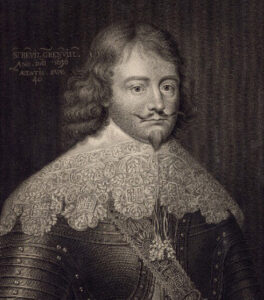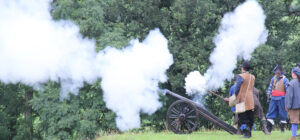The so-called English Civil War was a traumatic period in Britain’s history and, here, Tony Mansell brings us his thoughts of a great Cornishman who played his part in protecting his country from the new order.
I don’t suppose that the Reverend Robert Stephen Hawker would be included in any list of great poets but he was a prolific writer and some of his work is inspiring.
Surely, poetry should rouse emotions; bring sadness or laughter; promote reactions – it should never be mundane. Hawker certainly did this for me and for other people although some may be unaware that he wrote the song that we now know as “Trelawny” – Cornwall’s ‘national anthem’. I care not whether that piece truly relates to Bishop Jonathan Trelawny or that the cleric’s actions did not actually incite a rebellion. What I do know is that its words have a considerable unifying affect on the people of this land.
But it is not his most famous work that I have chosen; it is one that has a particular meaning for me. Like Trelawny it excites me, lifts my spirit and sends a shiver down my back. Perhaps its connection with Cornwall is a factor for I am a Cornishman before all else. But this piece is more than that. It is about a man who fought and died for a cause. A cause which undoubtedly appealed to Hawker but despite my choice of poem, not to me. I will try and explain later why, in spite of this, I would have marched in support of the man it extols.
Hawker was a 19th century Anglican Vicar with a benefice at Morwenstow. His writings often relate to times past and my chosen piece is based on a person from the 1640s – when brother fought brother and father fought son in the bloody conflict curiously entitled the English Civil War.
Many considered Hawker to be eccentric and at times he seemed to actively encourage this notion. Whether or not his deathbed conversion to Catholicism was of his own free will, we may never know but he was a traditionalist and in his own words, he was “Cast in the old conservative mould,” one who seemed to look longingly to the Stuart Church. It should therefore be of no surprise that his leanings were to the established order and that he should eulogise a man who fought for it.
The battlefields of the English Civil War extended far wider than the name suggests, hence my use of the word curious in respect of its name. Of all the areas and regions involved in the conflict only Cornwall committed itself completely to one side; the majority of its inhabitants supported King Charles and the retention of the monarchy.
 Sir Bevil(le) Grenville
Sir Bevil(le) Grenville
Sir Beville Grenville (1596 – 1643), a member of a prominent Cornish family, was one of the King’s staunchest supporters during the Civil War but we will never know if his decision to fight for Charles was taken immediately or after much soul-searching. He certainly objected to the King’s imprisonment of his compatriot, Sir John Eliot, for his outspoken objection to the King’s actions: in addition, he was a somewhat milder objector to the King raising a levy for the Scottish Wars. Perhaps it would not have been surprising if he had sided with Parliament but despite these differences, he could not bring himself to take up arms against the monarchy; the King was the King for all his faults.
As I have said, Cornwall remained loyal to the King but this was by no means certain in the early days of the conflict. It was only because of the prompt action by Sir Beville and his colleagues, in mustering support and ejecting the Parliamentarians from Cornwall, that this was achieved. Pockets of resistance were eliminated and those of a different persuasion either moved across the Tamar or learnt to keep their mouths shut.
It is easy to see the Civil War as yet another religious conflict and some historians believe this to be the case. Since Henry the VIII, the country had followed successive monarchs as they took up the cause of either Catholicism or Protestantism. Then along came Charles, a Danish Scot, who had married a Catholic and who did not hide the fact that he was receptive to the church returning to a more traditional form of ritual and idolatry. Catholicism by the back door? Maybe! The Puritan members of Parliament thought so and they resolved to oppose him.
As with the rest of the country, religion would have figured high in Cornwall. The Prayer Book Rebellion of 1549 is evidence that there had been a reluctance to forsake Catholicism: Protestantism had been adopted but only after a considerable struggle. It is unlikely that the new Puritan teaching had penetrated the Cornish speaking areas of the Duchy so any movement in its religious leanings was always likely to be back towards the high church rather than to the simpler form.
But while the Catholic issue is often quoted as the catalyst for the conflict, the combatants were not drawn up along these clear religious lines; many Catholics opposed the King and some Puritans could not bring themselves to draw swords against him. Religious divisions certainly played their part but recent commentators see the problem as more complex than suggested by this simplistic explanation.
This was a time of increasing enlightenment; Parliament’s role of gentle acquiescence to the King was approaching its end and, for many, the idea that the King was appointed by God with a divine right to rule was anathema. Before long the Levellers would find their voice and, for them, even the comparative equality under Cromwell was not sufficient.
But if people could go along with the religious shift and even accept that the King was supreme in all things, then there was another factor which caused considerable unrest, the result of his actions on their pocket. The King’s failed foreign policy, his ostentatiousness and extravagance contributed to the high level of taxation in the country and many were thrown into prison for refusing to pay.
In the past, Cornwall had rebelled against high taxation and now, Charles had imprisoned some of its notables for withholding payment. Taxation in respect of the wars in Scotland must have been particularly galling considering the Duchy’s remoteness from that country. Ship Money was more understandable and relevant to the area: coastal protection from the ships of France and Spain, and even the Barbary Pirates, was necessary but, even so, the high level of taxation made life difficult for this relatively poor area.
Grenville must have weighed these matters in his mind as he decided his course of action. But there was one further issue which I believe was paramount and sufficiently compelling for me to select a poem about a man who influenced and led the people of Cornwall in support of the monarchy.
In many areas the Duchy was still seen as a foreign country – certainly amongst the men of the Parliamentarian Army. Perhaps its remoteness from London and certainly its history, contributed to that view. It was clear that the new order being pioneered by Parliament was a threat to the relative autonomy that Cornwall enjoyed and the later destruction of The Duchy Palace at Lostwithiel was seen as a deliberate move to obliterate a semblance of independence. The potential loss of its Stannary Laws and the homogeneous nature of their central policies would make it just like any other county. To the people of Cornwall it was not acceptable.
If I had lived at that time, and in any place other than Cornwall, then I would have played a part in the burgeoning republican democracy. I would have sought to help eliminate a rule based on class and birth – I would have fought with Parliament. But Parliament’s threat to the Cornish way of life would have changed my view. It would have led me to compromise my beliefs and I have no doubt that I would have chosen to fight with the Grenvilles, the Slannings and the Trevanions. Yes, for a type of rule which I would have found repugnant but, overriding that, for the defence of my homeland.
Sir Beville Grenville was a Cornish leader whose actions earned him universal respect and love. He was a patriot who died fighting for his beliefs and for his beloved Cornwall.
It has been difficult to select just two lines from Hawker’s evocative poem Sir Beville but I have done so and they are taken from its conclusion.
So at Stamford he fought and at Lansdowne he fell
but in vain were the visions he cherished
For the great Cornish heart that the King loved so well
in the grave of the Grenville is perished
 Grenville’s monument 1720
Grenville’s monument 1720
References:
This article has been written using information from many books and articles – too many to credit here.

Tony Mansell is the author of several books on aspects of Cornish history. In 2011 he was made a Bardh Kernow (Cornish Bard) for his writing and research, taking the name of Skrifer Istori. He has a wide interest in Cornish history and is a researcher with the Cornish National Music Archive and a sub-editor with Cornish Story: an Institute of Cornish Studies initiative.


Great stuff Tony.
Could have done with this when I guided at Prideaux Place where they have a splendid portrait of Sir Beville.
Thanks John.